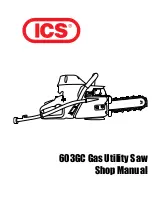
37
37
RIVING KNIFE
The riving knife is very similar to the spreader on the blade guard assembly. It is a metal plate
that prevents the newly cut workpiece from pinching the backside of the blade and causing
kickback. It also acts as a barrier behind the blade to reduce the risk of hands being pulled into
the blade if kickback occurs.
The key difference between the spreader and the riving knife is that the riving knife mounts
below the blade's highest point of rotation so that it can remain installed for non- through cuts.
The riving knife must be kept within the range shown in the following figure. For that reason, a
12" blade is required for operations that use a riving knife.
To ensure that the riving knife works safely, it MUST be
aligned with and correctly adjusted to the blade. Check and
adjust the riving knife alignment as needed.
Place a straightedge against the blade and the spreader.
When properly aligned, the spreader/riving knife will be in
the "alignment zone," as shown, and will be parallel with the
blade.
e
Riving Knife Thickness
b
Saw Blade Thickness
B
Blade Kerf (width of saw blade cut)
Summary of Contents for TS-1248P
Page 4: ...52 Saw Body Parts List A B 94...
Page 81: ...77 77 ELECTRICAL DIAGRAM...
Page 82: ...78 78 ELECTRICAL CONNECTIONS...
Page 83: ...79 79 BLADE GUARD MITER AND ACCESSORIES PARTS DIAGRAM A A...
Page 86: ...82 82 FENCE PARTS DIAGRAM...
Page 89: ...85 85 52 EXTENSION TABLE AND RAILS PARTS DIAGRAM...
Page 91: ...87 87 SAW BODY PARTS DIAGRAM A...
Page 92: ...88 88 SAW BODY PARTS DIAGRAM B...
Page 103: ...99 99 NOTES...
















































